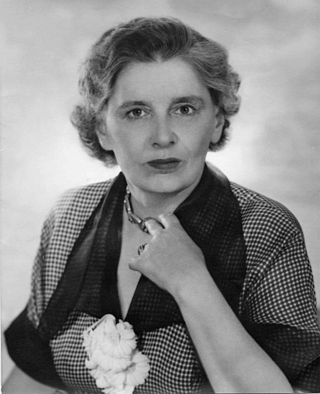
Dame Cecily Isabel Fairfield, known as Rebecca West, or Dame Rebecca West, was a British author, journalist, literary critic and travel writer. An author who wrote in many genres, West reviewed books for The Times, the New York Herald Tribune, The Sunday Telegraph and The New Republic, and she was a correspondent for The Bookman.
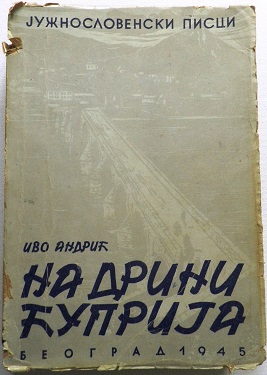
The Bridge on the Drina is a historical novel by the Yugoslav writer Ivo Andrić. It revolves around the Mehmed Paša Sokolović Bridge in Višegrad, which spans the Drina River and stands as a silent witness to history from its construction by the Ottomans in the mid-16th century until its partial destruction during World War I. The story spans about four centuries and covers the Ottoman and Austro-Hungarian occupations of the region, with a particular emphasis on the lives, destinies, and relations of the local inhabitants, especially Serbs and Bosnian Muslims.

Geraldine Brooks is an Australian American journalist and novelist whose 2005 novel March won the Pulitzer Prize for Fiction.
The genre of travel literature or travelogue encompasses outdoor literature, guide books, nature writing, and travel memoirs.

Harold Albert Lamb was an American writer, novelist, historian, and screenwriter. In both his fiction and nonfiction work, Lamb gravitated toward subjects related to Asia and the Middle East.
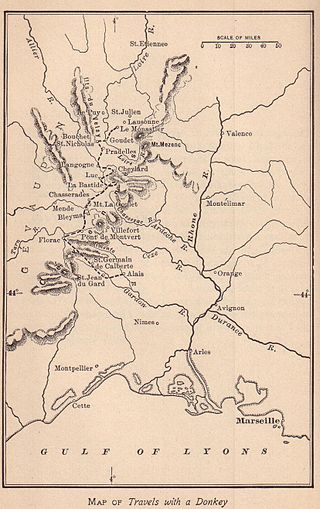
Outdoor literature is a literature genre about or involving the outdoors. Outdoor literature encompasses several different subgenres including exploration literature, adventure literature and nature writing. Another subgenre is the guide book, an early example of which was Thomas West's guide to the Lake District published in 1778. The genres can include activities such as exploration, survival, sailing, hiking, mountaineering, whitewater boating, geocaching or kayaking, or writing about nature and the environment. Travel literature is similar to outdoor literature but differs in that it does not always deal with the out-of-doors, but there is a considerable overlap between these genres, in particular with regard to long journeys.
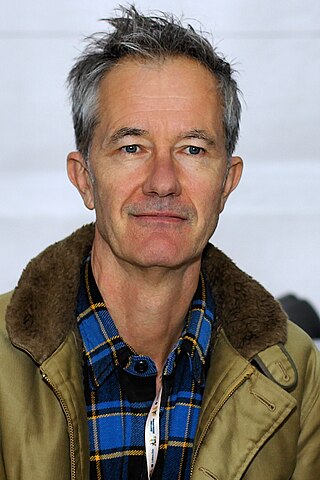
Geoff Dyer is an English author. He has written a number of novels and non-fiction books, some of which have won literary awards.

Sušak is a part of the city of Rijeka in Croatia, where it composes the eastern part of the city, separated from the city center by the Rječina river, which in former times served as an international border. Notable features of Sušak include the public beaches at Pećina and Glavanovo, along with the Tower Center shopping mall.

The Monastery of Saint Naum is a Macedonian Orthodox monastery. It is named after the medieval Bulgarian writer and enlightener Saint Naum who founded it. The monastery is situated in North Macedonia, along Lake Ohrid, 29 kilometres (18 mi) south of the city of Ohrid, within the boundary of the village of Ljubaništa.

Kolašin is a town in northern Montenegro. It has a population of 2,989. Kolašin is the centre of Kolašin Municipality and an unofficial centre of Morača region, named after Morača River.
The non-fiction novel is a literary genre that, broadly speaking, depicts non-fictional elements, such as real historical figures and actual events, woven together with fictitious conversations and uses the storytelling techniques of fiction. The non-fiction novel is an otherwise loosely defined and flexible genre. The genre is sometimes referred to using the slang term "faction", a portmanteau of the words fact and fiction.
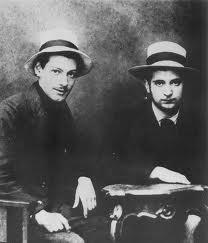
Stanislav Vinaver was a Serbian writer, poet, translator and journalist. Vinaver was born to affluent Ashkenazi Jewish parents that had immigrated to Serbia from Poland in the late 19th century. He studied at the University of Paris, volunteered to fight in the Balkan Wars and later took part in World War I as an officer in the Royal Serbian Army. In 1915, he lost his father to typhus. He travelled to France and the United Kingdom the following year, delivering lectures about Serbia and its people. In 1917, he was assigned to the Serbian consulate in Petrograd, where he was to witness the Russian Revolution and its aftermath.
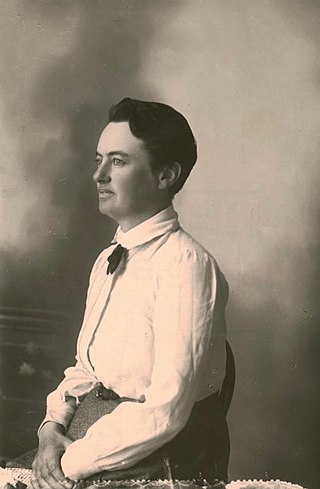
Mary Edith Durham, was a British artist, anthropologist and writer who is best known for her anthropological accounts of life in Albania in the early 20th century. Her advocacy on behalf of the Albanian cause and her Albanophilia gained her the devotion of many Albanians who consider her a national heroine.
Mercia MacDermott was an English writer and historian. She was known for her books on Bulgarian history.

When You Reach Me is a Newbery Medal-winning science fiction and mystery novel by Rebecca Stead, published in 2009. It takes place on the Upper West Side of New York during 1978 and 1979 and follows a sixth-grade girl named Miranda Sinclair. After Miranda finds a strange note, which is unsigned and addressed only to "M," in her school library book, a mystery is set into motion—one which Miranda ultimately must face alone. At the same time, Miranda juggles school, relationships with her peers, and helping her mom prepare for an upcoming appearance on The $20,000 Pyramid, a popular game show hosted by Dick Clark. Important characters in the story include Miranda's mother; Richard, her mom's good-natured boyfriend; Sal, Miranda's childhood best friend; and a homeless man who lives on Miranda's block and is referred to only as "the laughing man." Central themes in the novel include independence, redemption, and friendship.
Rebecca Stead is an American writer of fiction for children and teens. She won the American Newbery Medal in 2010, the oldest award in children's literature, for her second novel When You Reach Me.

Anica Savić-Rebac was a Serbian writer, classical philologist, translator, professor at the University of Belgrade. She wrote a number of essays and books about Njegoš, Goethe, Sophocles, Spinoza, Thomas Mann, Greek mystical philosophers, Plato, theory of literature. She also translated a number of works from Serbian into English, most notably The Ray of the Microcosm by Petar II Petrović-Njegoš.
Sabrina Petra Ramet is an American academic, educator, editor and journalist. She specializes in Eastern European history and politics and is a Professor of Political Science at the Norwegian University of Science and Technology (NTNU) in Trondheim.

Milan Kašanin was a Serbian art historian, art critic, curator and writer. He served as the head of three Belgrade based museums, the Museum of Prince Pavle, the Museum of Contemporary Art and the Gallery of Frescoes.
Berit Backer was a Norwegian social anthropologist and ethnographer, head of the Institute of Peace Research (PRIO) between 1978 and 1982 in Norway. Backer was a human rights activist who fought for Albanian national causes for much of her life. She published literature on Albanian family structures from studies conducted in the village of Isniq, in the Rugova valley of Kosovo. During her first visit to Albania in 1969, she became fascinated by the Albanians, and their culture and struggle for independence. She dedicated her research for a scholarly degree in social anthropology. Berit was fluent in Albanian. She published the book Behind Stone Walls, a social anthropological study of traditional Albanian society. It focuses on the formation and evolution of household and family structures among the Kosovo Albanians. It was written on the basis of fieldwork carried in the village of Isniq in western Kosovo in 1975. Backer died suddenly in 1993 after having been stabbed to death by a mentally disturbed person. John Halliday, editor of the memoirs of Enver Hoxha called her "an Albanian expert". In 2018, Kosovos prime minister Hashim Thaqi dedicated the Presidential Jubilee Award to the Backer family.














